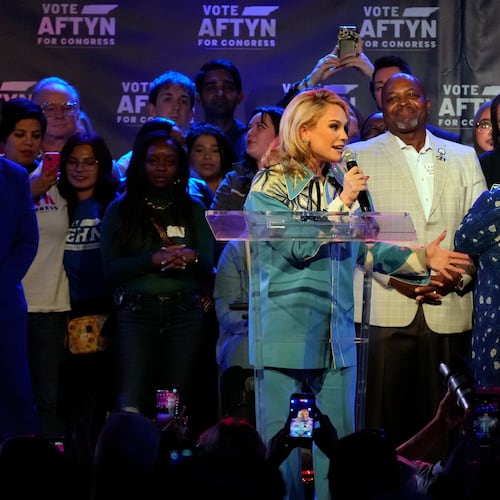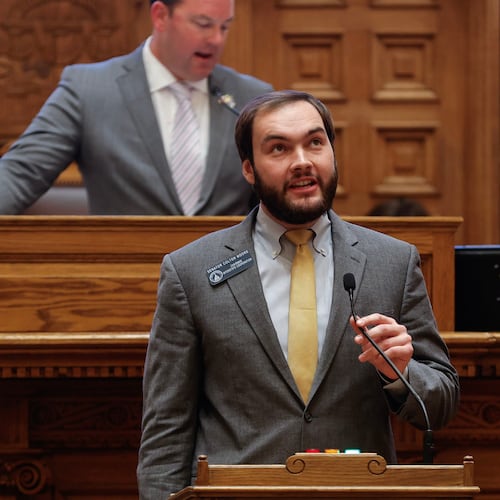They know their chances of winning are slim to none. That’s not the point.
For Democrats running in strong GOP districts and Republicans running in districts President Joe Biden won by 80% or more, their candidacy is symbolic and strategic.
“I have no fantasy, no thoughts of winning by any stretch of the imagination,” said Kim Floria, a Democrat running for Georgia’s House District 30, which covers parts of Hall County. “I’m just part of the puzzle.”
The 2020 presidential election in Georgia was settled by fewer than 12,000 votes, and both campaign operations here know that this year’s race will likely also be determined at the margins.
One method to chip away at leads in each party’s geographic stronghold is to run candidates for every office on the ballot, including state legislative seats. The thinking is that giving voters a chance to support more candidates from their preferred political party will help increase turnout. That could net a few more votes for the top of the ticket.
“The down ballot helps the top of the ticket. The top of the ticket helps the down ballot,” Floria said.
Helping the bigger picture
Candidates running for state House and state Senate seats in noncompetitive districts said they are running to give voters in their district a choice. There are 236 legislative seats in the Statehouse, and 93 this year faced no primary or general election competitor. In some districts, voters haven’t had a choice of candidates from both parties for many election cycles.
“It’s important to have two parties checking the balance and to get our message out,” said Barry Zisholtz, a Republican running in House District 86, which covers parts of heavily Democratic DeKalb County.
According to an analysis from Fair Districts GA, a redistricting advocacy group, just five races were competitive in 2022 after legislators redrew their districts. Two years later, the picture is much the same.
This year, some Democrats are serving as a sort of surrogate for Harris, even while facing certain defeat. By knocking on doors for their campaign, they have an opportunity to spread her message and help reach voters directly in places Harris may not go.
“I do believe I have a part to help the Harris campaign. I think we all do,” Floria said. She ran for the same seat against incumbent Republican Derrick McCollum in 2022, earning just 24.3% of the vote. If she could move her numbers to, say, 32%, “I could help the bigger picture,” she said.
Floria is one of several Democrats who were recruited to run or supported in their campaign by the Fighting 50, a liberal organization that aims to ensure no Republican candidate goes unopposed.
Melanie Miller is a Democrat running against incumbent Republican Trey Rhodes for House District 124. The district spans parts of Greene and Oglethorpe counties, and Miller is also aligning her campaign with the Democratic presidential nominee.
Credit: Curtis Compton for the Atlanta J
Credit: Curtis Compton for the Atlanta J
“The Harris-Walz campaign and the Melanie Miller campaign pretty much go hand in hand,” she said.
Miller is realistic about her odds. She has other ways to measure success, she said.
“I am hoping to increase the number of registered voters and bring awareness to what’s going on in our district,” such as a lack of mental health resources, she said.
In Camden County, Defonsio Daniels said he initially wanted to run for sheriff because of perceived corruption in the county jail. Then he got a phone call from the Fighting 50 asking him to run for the state Legislature.
He said no three times before driving up to Atlanta, right at the deadline, to qualify for the race for House District 180 against incumbent Republican Steven Sainz.
However, some candidates, such as Kevin Aronhalt, said they’re not too concerned about national politics. He’s running as a Democrat in House District 13 against incumbent Republican Katie Dempsey.
“There are some benefits to me running that will help the cause, and I’m aware of that,” he said. “But that’s not the driving goal.”
He’s focused on local issues, such as mental health resources, Medicaid expansion and abortion access.
“It just so happens that the ‘We’re not going back’ messaging (from the Harris campaign) and the joy and those sentiments are exactly what my campaign is,” he said.
His campaign, though likely futile, is nonetheless mission-driven.
“The overriding message is that our current representative is making decisions that hurt us, and you don’t have to accept that anymore,” Aronhalt said. “You have a choice.”
‘Making it about who I am’
Samuel Lenaeus, a Republican running for House District 55 against incumbent Democrat Inga Willis, is aware that he’s a long-shot candidate, but he believes voters “deserve to have a choice” to cast their ballots for a GOP candidate.
“You just have to put your name out there and let the odds fall where they fall,” he said. “I’m not putting a whole lot into that I’ll win or that I’ll lose. I’m putting a lot in that I’m a different choice.”
Zisholtz entered the race for House District 86 after a political organizer knocked on his door and shared critiques of the district’s incumbent, Democrat Imani Barnes. An Orthodox Jewish man, Zisholtz said he was dismayed when he learned that Barnes did not vote on a Georgia House resolution that condemned the deadly Hamas attack against Israel on Oct. 7 as a “disgusting display of hatred and evil.”
“I said, ‘Who is this person?’ ” Zisholtz recalled. He then asked who was running against her. “It was quiet. She said, ‘Nobody.’ Then I said, ‘You’re asking me to do something that I’ve never done in my life.’ ”
Ultimately, he decided to run. “I have to defend what’s right,” he said.
Republicans are also using a bottom-up strategy, said Marci McCarthy, chair of the DeKalb County Republican Party. She hopes to increase support for Trump from 58,000 votes in 2020 to about 70,000 this year.
“For the first time in decades, DeKalb residents have an opportunity to have a Republican and a Democrat on their down ballot,” she said. “We’re hoping by having those down ballot candidates that we’re able to do a lift up to the top.”
On the campaign trail, for both Lenaeus and Zisholtz, Trump’s name often goes unmentioned.
“I am supporting the conservative candidate for president,” Lenaeus said, but he added, “I’m more of an ally directly to Gov. (Brian) Kemp.”
Zisholtz said that if somebody pushes him, “I’m a supporter of Trump.”
But, he added, “I’m making it about who I am and who the person is I’m running against.”
About the Author
Keep Reading
The Latest
Featured






